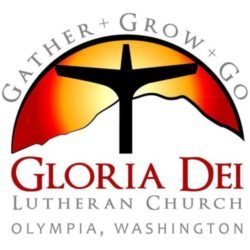Gloria Dei Land Acknowledgement
In November of 2021, council approved offering a Land Acknowledgement at the start of worship for the month of November as part of Native American Heritage Month, as well as once a month thereafter, and having it printed in our worship bulletin/folder/Keynote/and Intercom on a regular basis. Throughout the staffing transitions that transpired our Land Acknowledgement was lost in the shuffle. We are bringing it back in to worship at this time.
Information about Land Acknowledgements is below along with a written Land Acknowledgement for us to use at GDLC. Ours is adapted from the Land Acknowledgement found on our synod website. The Native American Task Force met with Bishop Jaech over several months to write this Land Acknowledgement for our synod.

What is a Land Acknowledgment?
A Land Acknowledgment is a formal statement that recognizes and respects Indigenous Peoples as traditional stewards of this land and the enduring relationship that exists between Indigenous Peoples and their traditional territories.
Why do we recognize the land?
To recognize the land is an expression of gratitude and appreciation to those whose territory you reside on, and a way of honoring the Indigenous people who have been living and working on the land from time immemorial. It is important to understand the long standing history that has brought you to reside on the land, and to seek to understand your place within that history. Land acknowledgments do not exist in a past tense, or historical context: colonialism is a current ongoing process, and we need to build our mindfulness of our present participation. It is also worth noting that acknowledging the land is Indigenous protocol.
ELCA issues declaration to American Indian and Alaska Native people
As the United States pauses to honor and celebrate the Indigenous people who first settled on the land thousands of years ago, the Evangelical Church in America (ELCA) has released “A Declaration of the Evangelical Lutheran Church in America to American Indian and Alaska Native People.” The declaration is a direct result of the social policy resolution “Repudiation of the Doctrine of Discovery,” which was passed by the 2016 ELCA Churchwide Assembly.
In the declaration, the ELCA acknowledges the theological and Christian foundation of the Doctrine of Discovery, which has codified colonialism and religious intolerance as societal norms for more than 500 years.
“The Doctrine of Discovery created a theological framework that supported racism, colonialism, and the annihilation of Indigenous people,” the declaration states. “Today it continues to support these evils and injustices found in our church, U.S. law, and legal interpretation. The Doctrine of Discovery has been pervasive throughout the world and has benefited the Church and ELCA Lutherans in every way.”
Included in the statement is a confession to American Indian and Alaskan Native communities in the ELCA and in the United States. To those in the ELCA, the church declares, “We have devalued Indigenous religions and lifeways and have not challenged the invisibility of Indigenous people in American society.” Among other things, it confesses to treating these communities as a minority group rather than as sovereign nations and failing to do more to repudiate the Doctrine of Discovery after the formal repudiation was passed in 2016.
To American Indian and Alaska Native communities in the church and in the United States, the church confesses its role in diminishing the importance of the land and acknowledges the complicity of the ELCA and its predecessors in accepting the benefits of the land stolen through numerous colonial measures and broken treaties. It further confesses to its failures in combating white supremacy and in treating Native peoples as equals, listing the many ways in which the church needs to learn more about its harmful roles.
To the non-Indigenous communities of the ELCA, the church confesses that it has benefited from, and not acted against, the Doctrine of Discovery and has failed to proactively support the church’s American Indian and Alaska Native Lutheran Association.
The declaration concludes with a pledge to all three groups — Indigenous ELCA communities, Indigenous communities in the U.S., and non-Indigenous ELCA communities. Each pledge focuses on doing more to understand the doctrine, the church’s role in perpetuating it and how to partner with Native organizations to end the harmful effects of the doctrine and become stronger advocates for Indigenous communities throughout the U.S. The declaration ends with an understanding that accomplishing its goal to actively and fully repudiate the Doctrine of Discovery will take more than words; it will take tangible action to undo the damage created since the late-15th century.
Read the full text of “A Declaration of the Evangelical Lutheran Church in America to American Indian and Alaska Native People,” HERE.

